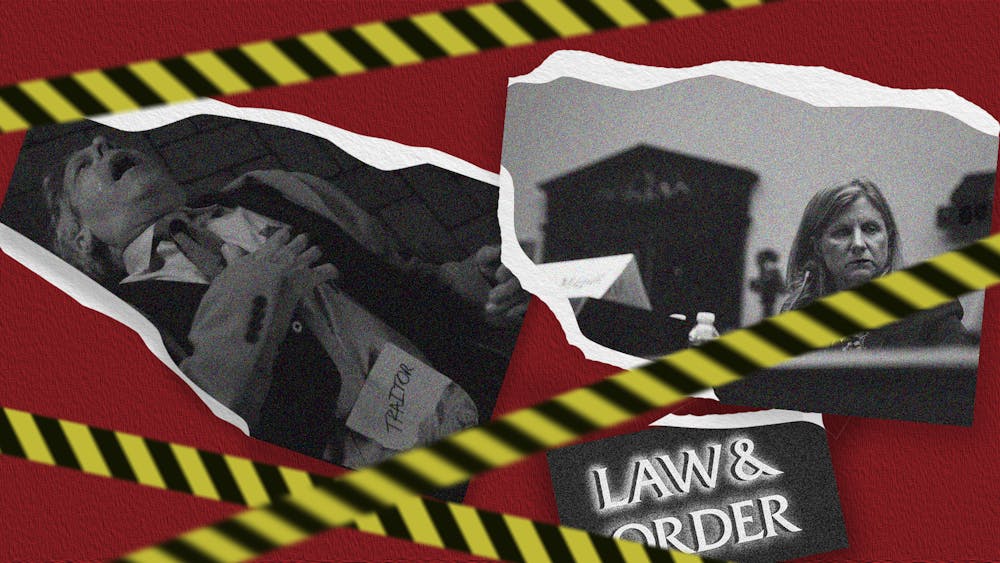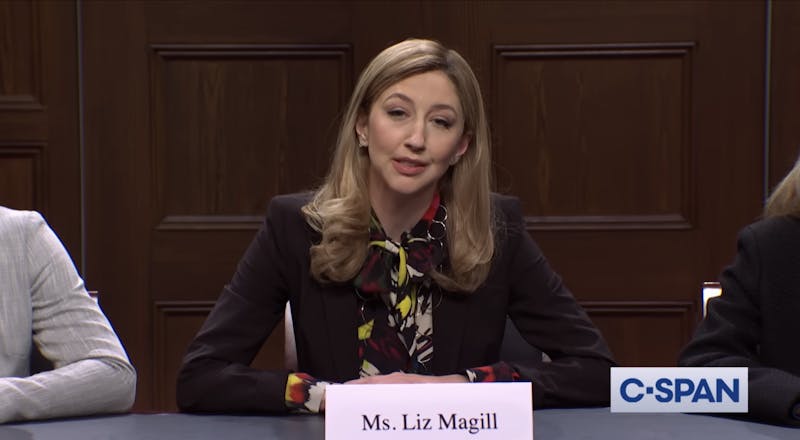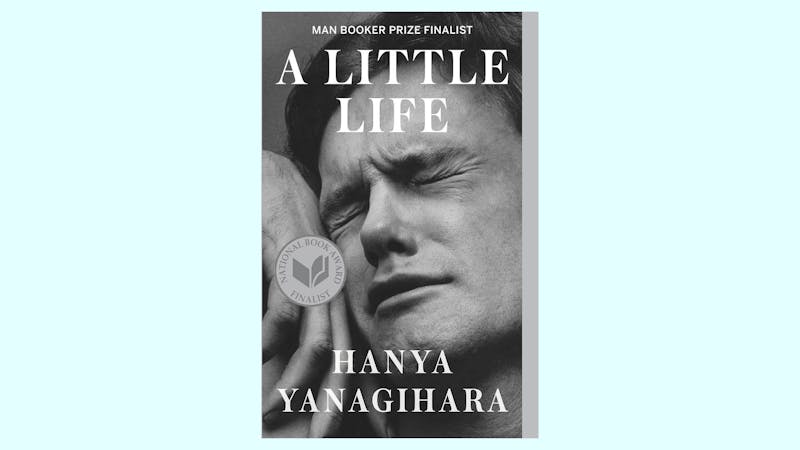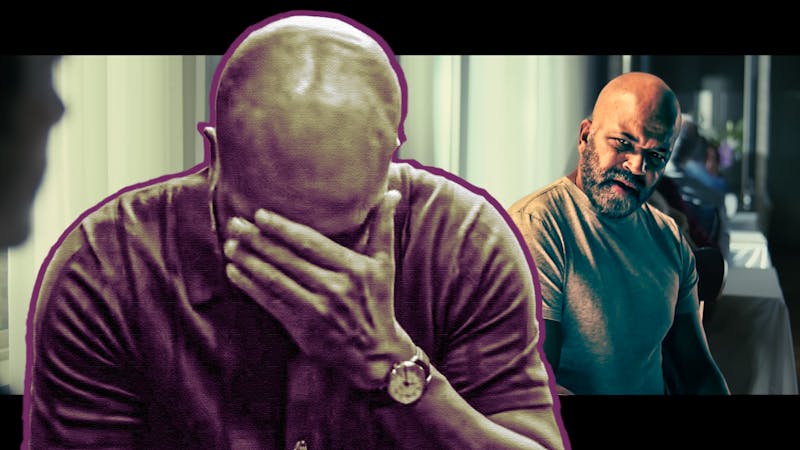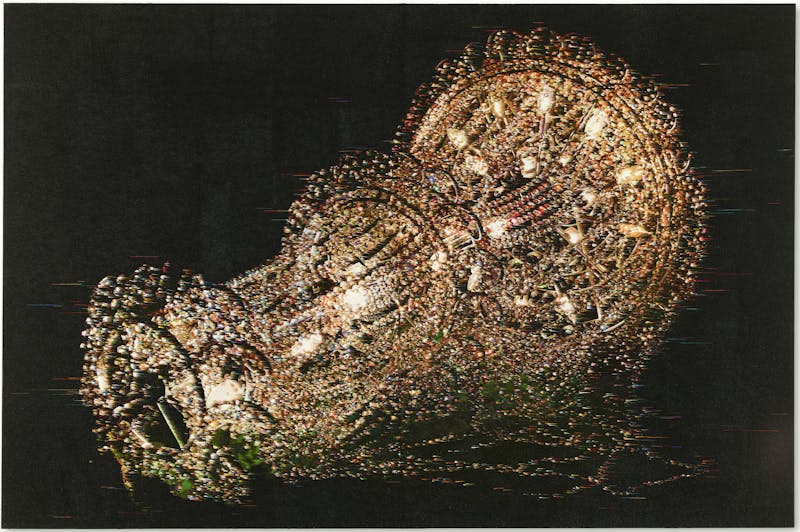It’s late at night, the sky deep purple against the New York City skyline as Hudson University President Nathan Alpert walks home. He’s agitated; criticism has been coming from every direction. The campus is in the midst of mounting tensions between pro–Israel and pro–Palestine advocates. Donors have pulled out funding and student groups are protesting. He’s heading home though, complaining to his wife on the phone over the contents of the day and promised a relaxing night for his troubles. But he pauses mid–sentence, noticing students spray–painting political imagery onto a building. He yells out to them as they disperse and turns to leave. But in that movement, his eyes widen. Out of nowhere, a knife plunges into the president’s body. He falls.
The Law and Order theme song plays and the screen turns black, reading: "The following story is fictional and does not depict any actual person or event."
Did they just kill Liz Magill?
On Jan. 18, 2024, America’s favorite legal drama, Law and Order, aired the first episode of its 23rd season. Titled “Freedom of Expression,” the hour–long segment follows the unraveling of a trial surrounding the murder of imagined Hudson University President Nathan Alpert. The episode is underscored by mounting tensions regarding free speech amid pro–Israel and pro–Palestine demonstrations. The university president remained a controversial figure, characterized by some as an irresponsible advocate of free speech and criticized by others as biased and politically immoral.
Despite opening with a disclaimer that all people and events depicted are "fictitious," Law and Order often explicitly draws inspiration from real–life crimes, from the contemporary Spa Shootings in Atlanta to the reemerging obsession with Jeffrey Dahmer. The show’s plots are often considered “ripped from the headlines.”
It’s clear that the Season 23 premiere is a close allegory of the current campus free speech conflict across the nation, referencing Penn most specifically. For the past year, former Penn President Liz Magill has faced scrutiny from all sides—donors, national media, and Congress—over her response to campus speech in the wake of the Israel–Hamas war, culminating in her resignation.
In the Law and Order episode, the Hudson University president is facing similar backlash for his handling of campus expression. The episode is littered with references that map almost exactly to real–life events that have occurred here on campus, to the point that Alpert’s death seems metaphorical of Liz Magill’s resignation.
In the episode, donors were pulling out funding from the fictional campus over a Palestinian film festival, which parallels the Palestine Writes Literature Festival that catalyzed Penn’s first wave of donor threats and pushback. Hudson University students who were organizing for Palestine were disappointed by their president’s threats to discipline a student group for showing a film critical of Israel, not far from Penn’s reaction to the “Israelism” screening by the progressive Jewish group Penn Chavurah. There’s even an out–of–place reference to a professor who was fired for criticizing transgender athletes, referencing a national cultural debate that took place center stage here at Penn.
At one point, a cop asks exactly what we’re all thinking, “Isn’t that like what happened at the University of Pennsylvania?”
It wasn’t until over two decades after he graduated from Penn that alumnus Dick Wolf (C’69) created the hit NBC show Law and Order. With over 490 episodes, the show has developed into a full universe that has played a critical role in informing the American public’s perception of the criminal justice system. Wolf, attributed as one of the richest men in television, has been closely involved with Penn’s campus, funding the development of the eponymous Wolf Humanities Center and endowing the Dick Wolf Associate Professor of Television and New Media Studies in the Cinema Studies Department.
In the last year, however, Wolf has joined the ranks of donors who have cut ties with Penn. Wolf called for Liz Magill and former Penn Board of Trustees Chair Scott Bok to resign over the Palestine Writes Literature Festival. On Oct. 18, 2023, Dick Wolf sent a letter to Penn on Law and Order letterhead criticizing what he viewed as the emergence of hate speech on Penn’s campus. Exactly three months later, those very criticisms were rendered tangible on an episode of Law and Order itself.
Like any serial drama, Law and Order doesn’t pretend to espouse deconstructive legal theory. Rather, the crimes are salacious, existing largely for the entertainment of the weekday cable television viewers. The show is formulaic and predictable. Wolf himself laid out the recipe for every Law and Order episode to the Washington Post, stating, “Stories reflect current events but the show is basically the same. A murder mystery in the first half with a moral mystery in the back half.” Still, even with its lack of nuance, it provides unique insight to how the public understands and interprets the nature of the current events and crimes depicted.
As 20th century German film critic Siegfried Kracauer stated, popular mass media represents “the daydreams of society, in which its actual reality comes to the fore and its otherwise repressed wishes take on form.” In other words, as a means of popular media, the Law and Order episode can be interpreted as casting aside the truth and instead providing weight to the fears and perceptions around the current campus expression tensions.
Law and Order’s “Freedom of Expression” episode is a visual manifestation of those worst fears surrounding campus speech. The episode imagines a universe where unhindered speech on campus is fresh kindling for overt violence and instability. Simply put, it’s the worst nightmare of Penn’s donors—and everyone else watching this conflict play out on campus.
The episode surmises that free speech is a dangerous enterprise. After all, the fictitious university president’s murder isn’t the only death. Halfway through the episode, a president, a pro–Palestinian student–activist, and a pro–Israel professor are dead.
Gratuitous violence is hardly shocking within the soapy drama of late–night legal television. Still, there’s something particularly unsettling in watching characters, people who could easily represent your peers or professors, murdered in an alternate universe of your reality for the entertainment of audiences across the nation. Free speech kills presidents, but it also kills students and professors too.
In the United States, hate speech is protected under the First Amendment. There is no separate category of speech that regulates speech with potentially hateful content. Instead, under Supreme Court precedent, it is only once language translates into violence and harm that stopgaps are put in place. Think, “sticks and stones may break my bones but words may never hurt me.” But even then, the bright line between speech and harm is hard to place.
The Law and Order episode creates an explicit connection between ideas and action by indicting a professor who supposedly planted the idea in a student’s head to kill the president, even if she herself was not involved in the murder. At the end of the episode, it is a pro–Palestinian, presumably middle–class, white male college student charged with the president’s murder. It is implied that he’s been brainwashed by his Middle Eastern professor, Dr. Nassar, who frequently lectures to students about the Palestinian cause. His parents, straight out of a Norman Rockwell painting, are aghast at the transformation of their perfect boy in the clutches of Dr. Nassar’s manipulation.
Dr. Nassar is put on trial in an attempt to draw a connection between her ideas and his action—as if it were her words that stabbed President Alpert. She is the one, it is said, who put the knife in the student's hands and the ideas in his head. However, at the end of the show, she is acquitted and the student is put behind bars, his parents crying as he is dragged off stage.
Around 80% of Law and Order episodes end in some sort of victory, so it feels intentional that Dr. Nassar walks free in the end. The image of higher education as a factory of indoctrination has long been pushed by conservatives, who point to critical race theory and gender studies as harbingers of the collapse of American values. A significant majority of Republicans agree that college professors are trying to “teach liberal propaganda.”
The episode places these fears into the context of the campus free speech wars. Under this rhetoric, Law and Order asserts that free speech conflicts on campus are no longer about the authentic expression of young voices. Rather, the current tensions are presented as a symptom of the age–old indictment that universities are transforming students into soldiers for some imagined “woke agenda.” The students in the episode are represented as puppets for the will of adults, their ideas naive. They have no agency and even fewer lines.
On Friday night, on Penn’s campus, my friends hunkered down for bad TV and a stomachache–inducing ration of snacks. Earlier that week, there had been a demonstration by professors for academic freedom in the face of growing threats to its integrity.
Settling onto a haphazard arrangement of beanbags, we all sing along to the Law and Order theme song “Dun Dun” and laugh about our old lady TV habits. This Friday night ritual was our means of escapism. Instead, we found ourselves transported to an alternate reality of the world outside my dorm. We saw ourselves represented on screen, but as though we were looking at a funhouse mirror, laughing as we pointed out distorted campus reflections.
For Penn students, the Law and Order episode is nothing more than a caricature. But it would be naive to cast it aside as simply “bad TV.” Crime shows like Law and Order significantly impact viewers’ understanding of the news. In that lens, “Freedom of Expression” only continues to promote misunderstanding and misconceptions around campus free speech. This sensationalization will only perpetuate the rising tensions between our real lives here on campus and an outside world attempting to peer in.
